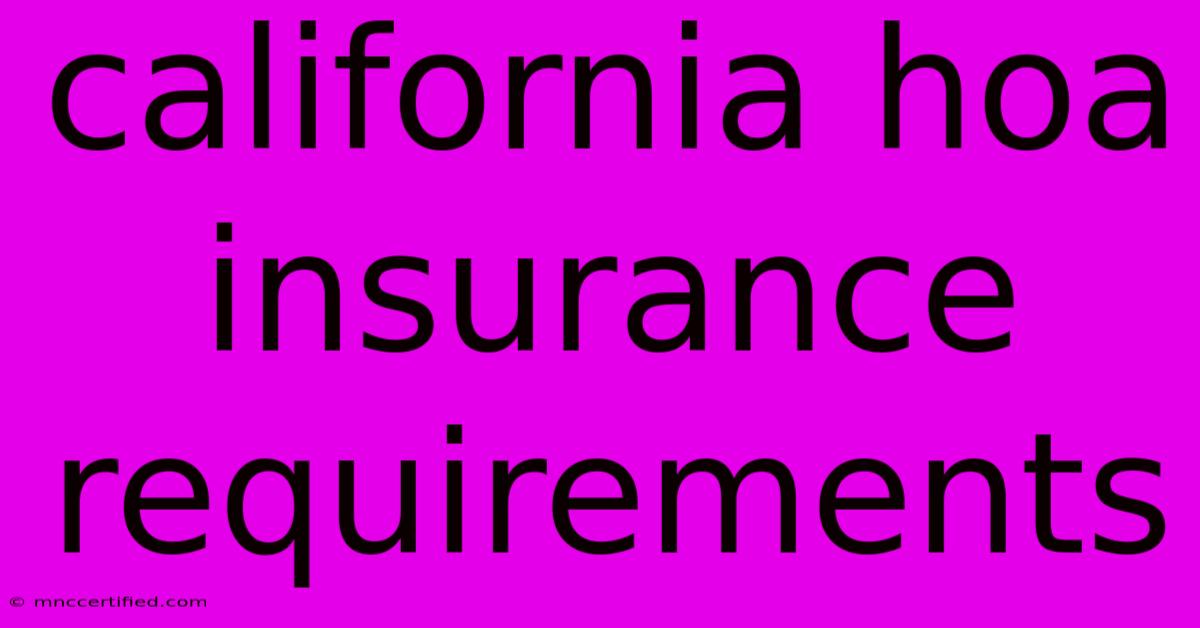California Hoa Insurance Requirements

Table of Contents
Understanding California HOA Insurance Requirements: A Comprehensive Guide
Living in a homeowner's association (HOA) community in California comes with a unique set of rules and regulations, including specific insurance requirements. These requirements are in place to protect both the HOA and individual homeowners from financial losses due to unexpected events. This comprehensive guide will clarify the essential insurance aspects you need to be aware of as a California homeowner within an HOA community.
What are the Basic Insurance Requirements for HOAs in California?
California law mandates that all HOAs obtain and maintain several types of insurance policies:
- Property Insurance: This covers the HOA's physical assets, such as common areas, buildings, and landscaping, against damage caused by perils like fire, wind, or hail. The policy typically includes coverage for liability, ensuring protection against claims arising from accidents or injuries occurring on the property.
- Liability Insurance: This protects the HOA from financial losses resulting from claims of negligence, bodily injury, or property damage. The coverage amount should be sufficient to cover potential legal expenses and settlements.
- Workers' Compensation Insurance: If the HOA employs staff, this insurance is mandatory to cover medical expenses and lost wages in case of work-related injuries.
What Insurance Does a Homeowner Need in an HOA Community?
While the HOA covers shared properties, individual homeowners are responsible for insuring their individual units and belongings. Here's what you need to know:
- HO-6 Insurance: This policy, specifically designed for condominium and townhome owners, covers your personal belongings, fixtures, and improvements made to your unit, including structural damage.
- Personal Liability Insurance: This covers you against lawsuits stemming from accidents or injuries occurring on your property or arising from your actions. It's crucial to ensure adequate coverage for personal liability claims, as your HOA's insurance will not cover these.
Important Note: It's vital to consult your HOA's governing documents and your insurance agent to confirm the specific requirements and coverage amounts mandated for your community.
Why are HOA Insurance Requirements So Important?
HOA insurance policies play a critical role in protecting both the HOA and individual homeowners. Here are the key benefits:
- Financial Protection: Insurance safeguards the HOA and homeowners against significant financial losses caused by unforeseen events like fires, natural disasters, or liability claims.
- Peace of Mind: Knowing that you and your community are financially protected in case of an emergency provides peace of mind.
- Legal Compliance: By complying with state insurance laws, HOAs avoid penalties and ensure the smooth operation of their community.
Tips for Managing Your HOA Insurance Coverage:
- Review your HOA's insurance policies regularly: Ensure that the coverage amounts are adequate and that the policies meet current community needs.
- Communicate with your HOA board: Ask questions and raise any concerns you have about the insurance policies.
- Compare insurance quotes: Don't be afraid to shop around for different insurance providers and compare prices to get the best deal.
- Keep accurate records: Maintain copies of your insurance policies and relevant documentation for easy reference.
Navigating the California HOA Insurance Landscape
Understanding the complex world of California HOA insurance requirements can feel overwhelming. This guide has provided a fundamental understanding of the essential policies and your responsibilities as a homeowner.
By diligently reviewing your HOA documents, communicating with your board, and actively managing your individual insurance coverage, you can ensure your financial security and peace of mind within your community.

Thank you for visiting our website wich cover about California Hoa Insurance Requirements. We hope the information provided has been useful to you. Feel free to contact us if you have any questions or need further assistance. See you next time and dont miss to bookmark.
Featured Posts
-
Ohio State Vs Purdue Free Live Stream Today
Nov 10, 2024
-
Nepal Secures Second U 19 T20 Win
Nov 10, 2024
-
Best Prepaid Card For Online Gambling
Nov 10, 2024
-
Crs Insurance Gettysburg Pennsylvania
Nov 10, 2024
-
Liverpool Relieved Salah Returns Before Break
Nov 10, 2024